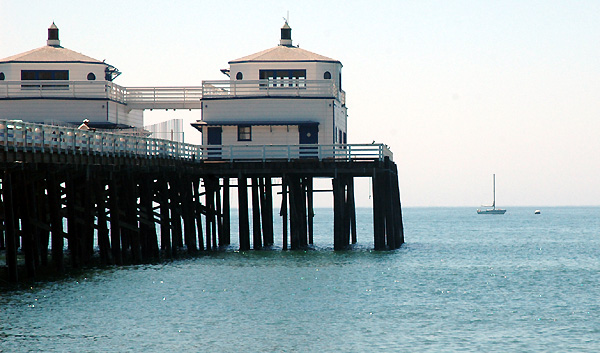Topic: Announcements
Redirection
The new issue of Just Above Sunset, the weekly parent site to this web log, is now on line. That would be Volume 3, Number 31 for the week of Sunday, July 31, 2005. This web log is only the staging area for a number of the current events items and a few of the photographs. The weekly, in magazine format, offers much more than do the immediate, sketchy items here.
This issue of Just Above Sunset, for example, introduces "Our Man in London" - Mike McCahill, film critic for The Scotsman, The Sunday Telegraph and the BBC. In what we hope will be a regular feature, he provides his personal insight into just what is happening there. Of course, we still have "Our Man in Paris," Ric Erickson (two columns this week) and a collection of this week's shots of Paris from Don Smith of Left Bank Lens. All this, along with columns now and then from "Our Man in Tel-Aviv," Sylvain Ubersfeld, make Just Above Sunset an international sort of thing. This week we also have an exclusive photo from the Green Zone in Baghdad, and a one from the Pocono Mountains. And there's more of Malibu for those readers who expect Southern California.
The commentary and analysis in the Current Events section is six deep this week - from Washington to Baghdad to Cincinnati - but that is balanced by six non-political feature items, including media notes, everything you ever wanted to know about "leap seconds" and a film column having to do with elevators.
Bob Patterson is back as usual, with book notes and some observations on what folks want written, and why they might not get what they want.
The usual quotes are there - Dali is quite mad Mark Twain isn't - and there's a link to a new photo album, another one.
Direct links to specific pages -
Current Events ________________
Semantics: Thucydides got it right a long time ago...
Tipping Point: Something Becomes News?
Hints and Rumors: Judy's Secret and the JAG Protest
Secrecy: News of What Didn't Happen, and of What Won't Happen
Ohio Gets Noticed: Cincinnati to the Moon
Ironies: Ironies that can only be seen from the left side...
Features ________________
Our Man in London: Greetings from London: Host City for the 2012 Olympics and Suicide Bombers' Paradise!
Our Man in Paris: France Paradise
Our Man in Paris Illustrated: Under the Sand, the City
News Notes: What's The News? What You Want It To Be.
Film Notes: Something for a Hot Day in Los Angeles
Basic Science: Counting the Seconds, or Not
Bob Patterson ________________
WLJ Weekly: from the desk of the World's Laziest Journalist - Things done capriciously for no apparent reason are fun!
Book Wrangler: In the Bookstores During the Summer of 2005
Guest Photography ________________
Left Bank Lens: This Week in Paris
Baghdad Exclusive: New Photo from the Green Zone
The Pocono Mountains: A Nature Shot
Local Photography ________________
Malibu: Not Just Surfers
The Usual ________________
Quotes for the week of July 24, 2005 - Truth and the Root of All Evil
Links and Recommendations: A New Photo Album, All About Malibu
Malibu Pier:

Posted by Alan at 16:27 PDT
|
Post Comment |
Permalink
Updated: Sunday, 31 July 2005 16:29 PDT
home




